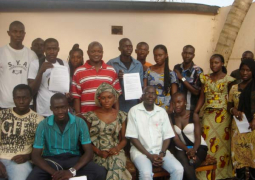
The
Food and Agriculture Organization (FAO) country office in collaboration with
the government of the Gambia, GOTG, on Wednesday convened a daylong project
inception seminar on the Technical Cooperation Programmes (TCP), to support
capacity development in conducting livestock census in The Gambia.
The
forum that brought participants from all the regions, including regional
governors, representatives from Ghana and farmers, as well livestock dealers,
was held at the Kairaba Beach Hotel.
In
his welcome remarks, Lamin Saine expressed profound gratitude to FAO and the
government of The Gambia for funding the nationwide enumeration of all domestic
animals, the first of its kind since 1993.
The
government has inter alia identified the livestock sector as an engine for
poverty alleviation, as manifested in its investment through the implementation
of livestock projects such as LHDP, PROGEBE and FASDEP.
According
to Mr Saine, the robust economic growth in Africa has been and is anticipated
to translate into a growing demand for animal-source foods such as meat and
dairy products, the consumption of which is correlated with income level,
population growth and urbanization.
This
provides opportunity for poverty reduction, economic growth and overall
contribution to the post- 2015 development Agenda.
Mr
Saine said the available data on the livestock from the 1993 census and NASS
reports, are insufficient to formulate and implement the necessary public and
private sector investment for livestock sector development, whose potential
contributions to economic growth, poverty reduction and food security risk thus
remain untapped.
According
to him, livestock plays a fundamental role in the Gambian economy and
livelihood, contributing about 10 per cent of GDP and 30 per cent of
agricultural GDP.
Reliable, updated information and data on
livestock numbers, products and production systems of the country are scanty
and not easily available. These data are needed for the appraisal, formulation
and implementation of livestock development programmes and projects.
He
said the census funded by FAO and the government of The Gambia would be jointly
conducted by department of Livestock Services, DLS, Gambia Bureau of Statistics
GBoS, Gambia Livestock Marketing Agency, GLMA, and the planning services unit
(PSU) of the department of Agriculture.
The census would be conducted in
October/November 2016, and data would be collected through oral inquiry by
enumerators.
He
then thanked the FAO country office for their continued support to the
government of The Gambia.
In
delivering a speech, the deputy FAO country representative, Mariatou Njie Faal,
said the TCP was designed to complement government’s efforts in the
availability of accurate and reliable information on livestock in the country,
thus contributing in the decision making and planning in the livestock sector
for economic growth and social well-being.
The
Gambia has set a goal to become a middle- income country by 2020 with a vibrant
commercialized agricultural sector. The livestock sector would play an
important role in that journey.
She
added that livestock contributes significantly to the national economy and
livelihood of the population. In all, it contributes about 30 per cent of the
agricultural GDP and about 10 per cent to the national GDP.
She
said as the sector grows, both the government and private sectors, including
farmers, require accurate and reliable data on which to base decisions about
polices, regulations, programmes and investment in the sector.
According
to Mrs Njie, the objective of the inception workshop is to provide an overview
of the project, and sensitize the participants on the need for the census, the
roles and responsibilities of all the key stakeholders and conduct of the
census.
She
further reaffirmed FAO continuous commitment and assistance to the department
of Livestock Services for the successful implementation of the project.
FAO has already engaged its pool of technical
experts in both agricultural statistic and livestock production and health at
all levels to provide adequate technical support.
She
also thanked the government of The Gambia through the Ministry of Agriculture
for the excellent relationship which FAO enjoys with its government partners,
and took the opportunity to reaffirm their commitment to deepening its
collaboration and cooperation with the government of The Gambia.



